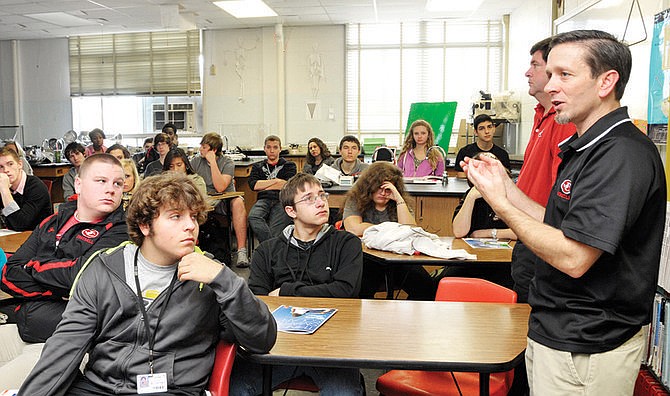As the demand for electricity continues to increase - and the need for clean, renewable continues to grow - what will the future of solar energy be?
Astronomy and AP Biology science students at Jefferson City High School were asked on Tuesday to give that question some thought, after listening to Paul Hemmel and Eric Burkett, co-owners of Missouri Solar Solutions, share with students their enthusiasm for the new/old technology.
Teachers David Ganey and Rick Hurst hosted Tuesday's talk in observance of American Education Week. First held in 1921 to raise public awareness for the importance of education, the week is sponsored by the National Education Association. Ganey serves as president of the local Missouri NEA chapter.
Hemmel and Burkett not only talked about how solar panel systems convert light into energy, they also discussed how they mount solar panel arrays on home and business rooftops and chatted with students about how they tie their products into the AmerenUE power grid.
They used the panels they installed on top of Ganey's home as a case-example of how a small array can work efficiently to help a homeowner save money.
Hemmel, who runs the Columbia side of the business, became intrigued by solar after listening to friends from California talk up the technology's benefits. Burkett, a native Jefferson Citian with a long history in the IT business, has been fascinated for years.
"It took a lot of research and head-scratching" before the two men launched their small business four years ago, Burkett said. "We hope it's not a fad but a part of everyday life in the future."
He explained the firm uses "Enphase" microinverters to make solar more efficient and productive, basically, by allowing each panel to operate independently and monitoring them with web-based software.
They explained how it's possible for a homeowner - with the approval of their utility company - to not only generate enough energy for their own household, but also to supply electricity to the "grid."
They noted one of their customers reduced his energy bills from $149 in September of 2012 to $14 in 2013.
"You can see big, big savings," Hemmel said, adding he hopes Ganey's bill will soon be reduced to zero.
The students showed they were listening by asking many skeptical and probing questions. They wanted to know about return on investment, actual environment impact, the ease of upgrading a system and, of course, cost.
Senior Kordel Flanary wanted to know: "Can it power a house in a blackout?"
Burnett replied, as a safety measure for line workers, the technology senses outages and shuts down. But he noted it's possible to install battery banks to provide heat and energy to a home when necessary.
They also discussed the effort it has taken to build the small business. In its first year, the firm only installed one system. In its second year, it installed three. This year it is slated to install at least 16. The two men said it took years to build the credibility needed to establish a trustworthy reputation.
"It took a lot for us to get our name out there," Hemmel said.
Ganey said that's why teachers stress the school's Character Plus Initiative, which emphasizes qualities like integrity and honesty. "You need to realize you're building your own credibility right now," Ganey said.
After the class was over, Flanary and his friend, Jacod Stoehr, said the subject was very interesting. Flanary said he once examined the topic of solar energy in outer space for a speech and debate topic. Although the space idea lacked practicality, he said it makes more sense on planet Earth.
"It's viable, especially for domestic use," Flanary said.
Stoehr agreed.
"As we start looking toward the future, solar energy is going to be widespread and solar energy companies will see a lot of growth," he predicted.

